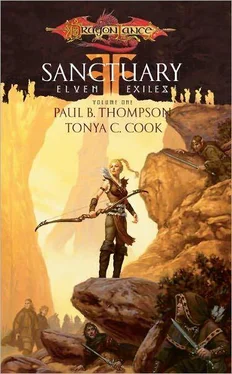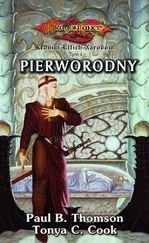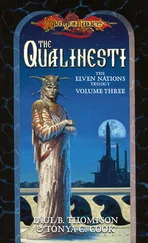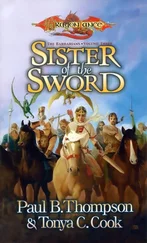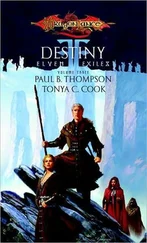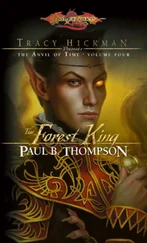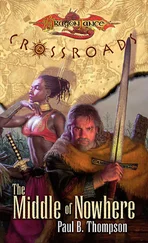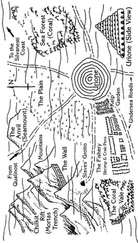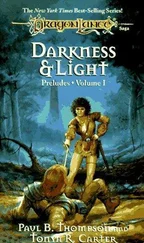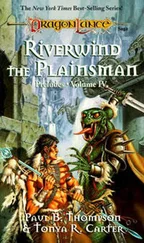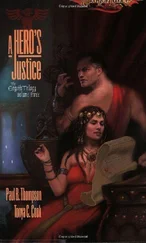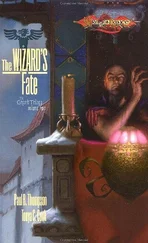Taranath and her other officers were naturally curious. They speculated that the Lioness planned to cause trouble for the Knights of Neraka, whose homeland lay just on the other side of the mountains to which they were headed.
She only wished that were the case. Much as she hated the minotaurs, Kerian reserved a special dark place in her heart for the Knights and their hirelings. They were the enemies of her blood, and she knew how to fight them.
The attempt to invade Silvanesti had been a grave mistake: she knew that now. Each day that passed with elven lands in the foul grip of their oppressors was pure torment to her, and her impatience had caused the debacle in the south. Wars, she was learning, were not won by dash and fury. The Lioness was practicing patience.
Even so, Gilthas’s fantasies about Inath-Wakenti were futile. Even if the valley existed and was habitable, it wasn’t their home, she thought. The sacred lands of Silvanos and Kith-Kanan were where the elven race belonged, and nowhere else. The Lioness felt that a better use of her fighting strength would be to mount small raids into the elven homeland, ambushing minotaur patrols, burning their depots, demolishing their bridges, and assassinating their leaders. By such methods she had all but retaken the Qualinesti countryside from the Knights of Neraka, although she was never strong enough to challenge their control of Qualinost, nor to attempt conclusions with the dragon Beryl.
To her curious officers she said, “The Speaker has a special purpose in sending us north. Fighting is not part of the plan. We’ll be escorting”—she groped for the proper word—“librarians from the royal archives.”
The warriors were uniformly startled. “Why send you, General? Any competent troop leader could handle such a simple mission,” asked Taranath.
“I go because my Speaker commands it.”
They nodded, acknowledging their obedience to their king. Kerian asked Taranath to tell her of the nomad attacks he’d suffered on the way back to Khuri-Khan.
He and the rest of the army had reached the coast without any problems, he said, thanks to the delaying action staged by the Lioness and her archers. The Qualinesti warrior had hoped his commander would explain how she survived, but she did not. He was too loyal and well-trained to question her about what had happened.
As the column moved up the coast, they encountered groups of nomads gathering dates and pine nuts from coastal groves. The nomads were driving their rangy cattle and goats to watering holes along the ancient seaside trail used by such herders for centuries. They gave the armed elves a wide berth, and there were no confrontations.
On the elves’ second day riding up the coast, they noticed mounted humans observing them. Taranath hadn’t paid them much attention at first because they were only a few and they were in front of the column, not behind. He logically assumed any pursuit from the Silvanesti border would appear from behind.
The first attack came when night fell. Heavy crossbow bolts flickered out of the high dunes on the elves’ right. A few riders and horses were hit. Taranath sent out a patrol. They found no one, but there were plain signs in the sand that half a dozen men with horses had hidden in the dunes.
This pattern continued through the night and into the following days. Angered by the sniping, Taranath sent more and more flankers to rout out the crossbowmen. All to no avail. It was like chasing smoke. The snipers repeatedly fell back, loosing quarrels at the flankers.
“If their aim had been better, they could have emptied many saddles,” Taranath said grimly. “As it is, their aim was too high.”
The Lioness nodded. It was common for novice crossbowmen to overshoot a target. A crossbow lofted its missiles in an arc, unlike the flat flight of an arrow loosed from a bow. Obviously, the nomads weren’t accustomed to the weapon.
The attacks ended only when the elves came in sight of Khuri-Khan. The elves never got close to the snipers, and their own archers never sighted a target long enough to draw a bead.
“One last thing, General,” Taranath said. “Our foes seemed to be nomads by the way they knew and used the desert, but I believe they came from Khuri-Khan. The tracks from the ambush sites led north, always north; the last sets came directly to the city.”
That made sense to Kerian. The men who had jumped her and Hytanthas on the Temple Walk were nomads, too, perhaps of the same band who’d harassed Taranath’s column. They obviously were operating out of Khuri-Khan, but why? Nomads regarded cities and their diverse inhabitants with the same suspicion they felt for foreigners like the elves; and Khuri-Khan, as the largest Khurish city, was considered particularly vice-ridden.
The dinner hour was approaching. Kerian left her loyal officers to return to the Speaker’s tent, and to attend her dinner with Gilthas and his archivist. Departing the officers’ tent, she made a slight detour to visit Eagle Eye in his pen. The griffon had to be confined away from the horses; his presence unnerved them.
Eagle Eye stood like a statue by his feeding post. His head was hooded like a hunting falcon’s, covered by green felt. This was the best way to keep him peaceful. When agitated, Eagle Eye uttered his shrill, gargling cry, and animals for miles around went into a panic.
Speaking softly to the creature, Kerian loosened the drawstrings and removed his hood. The griffon’s golden eyes, each as big as a king’s goblet, studied her intently.
“How are you, my friend?” she said. “Hungry? Of course you are.”
She went to the far side of the pen, to a darkly stained wooden cask. It smelled strongly of old blood. She pulled out a sheep haunch, none too fresh, just the way the griffon liked it. The scent of blood reached Eagle Eye and he parted his beak, allowing his rod-like tongue to taste the air. His leonine tail twitched back and forth. He chuckled impatiently.
“Coming, coming,” she said, amused.
She skewered the haunch on the hook hanging from the top of the feeding post. Eagle Eye waited until she’d stepped clear, then shuffled forward a few steps. He sank his hooked beak into the meat, ripping out a fist-sized bite, which he bolted down without swallowing. Many of her comrades couldn’t bear to watch the griffon eat. Kerian found the process edifying.
In short order the metal hook had been thoroughly cleaned. The griffon flared his wings, bobbing his head in appreciation. She gave his feathered neck an affectionate pat, and he allowed her to hood him again. She bid him good night.
Twilight had fallen. The great vault of sky over Khurinost and the Khurish capital was purple, streaked on the western horizon with scarlet and rose pink. Here in the army’s camp, there were few sunshades to block the view. Kerianseray lingered a moment, savoring the great expanse of sky and the cooling air that came with sunset.
Something flickered overhead. Birds were scarce in the desert, and she watched the movement curiously. Its shape and flight pattern seemed odd. After a moment, she recognized the darting flight of a bat. Strange. She hadn’t seen one of the creatures since leaving the woodlands of Qualinesti.
It fluttered by, maybe twenty feet above her head. The flapping of its soft wings was faint but distinct, as was the chittering sound it made, like the squeak of leather rubbing against glass. Then it was gone, darting away among the low canvas roofs and rising smoke plumes of the tent city.
Kerian looked down and discovered she was gripping the hilt of her sword. She didn’t know why, but the bat had alarmed her. Her heart was racing.
Lowering her gaze further, she saw something dark littering the sand beneath her feet. She knelt. The path was strewn with green leaves. Ash leaves. Yet, no such trees grew within three hundred miles of Khuri-Khan. More bizarre still, the leaves were green and supple.
Читать дальше
